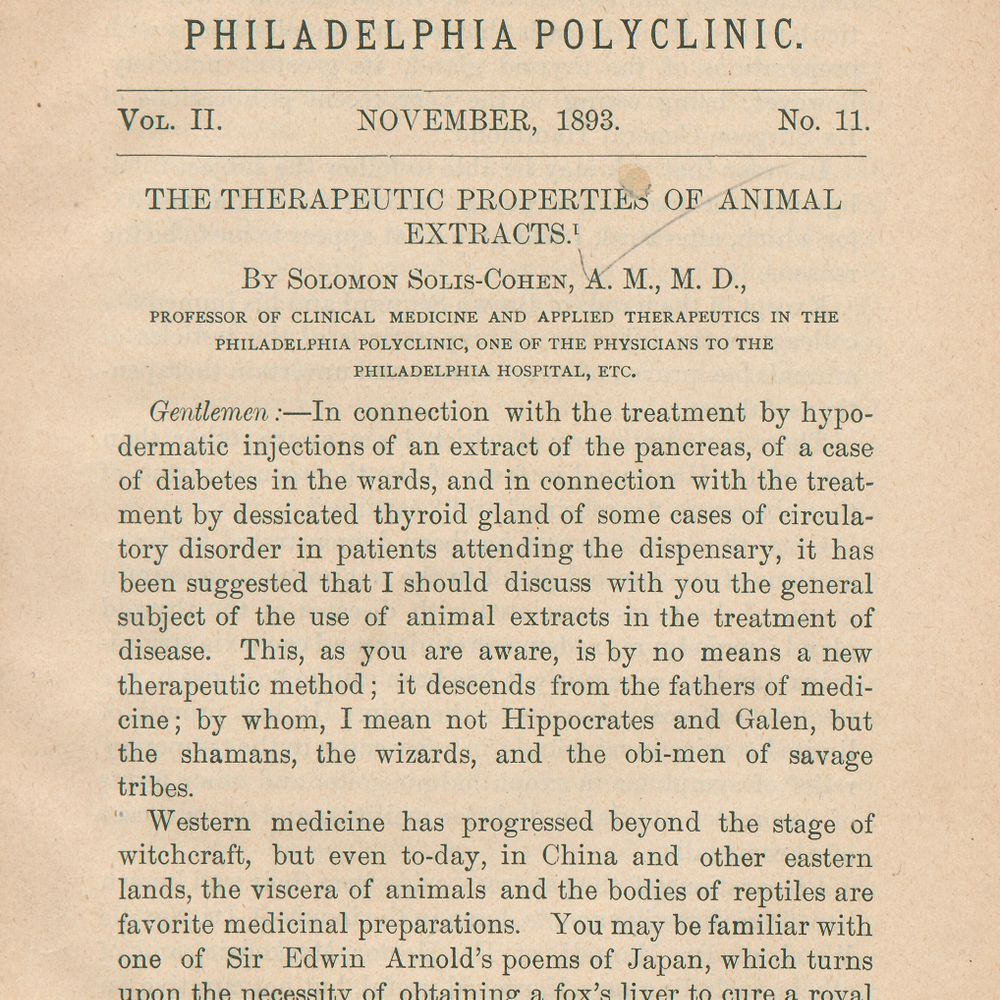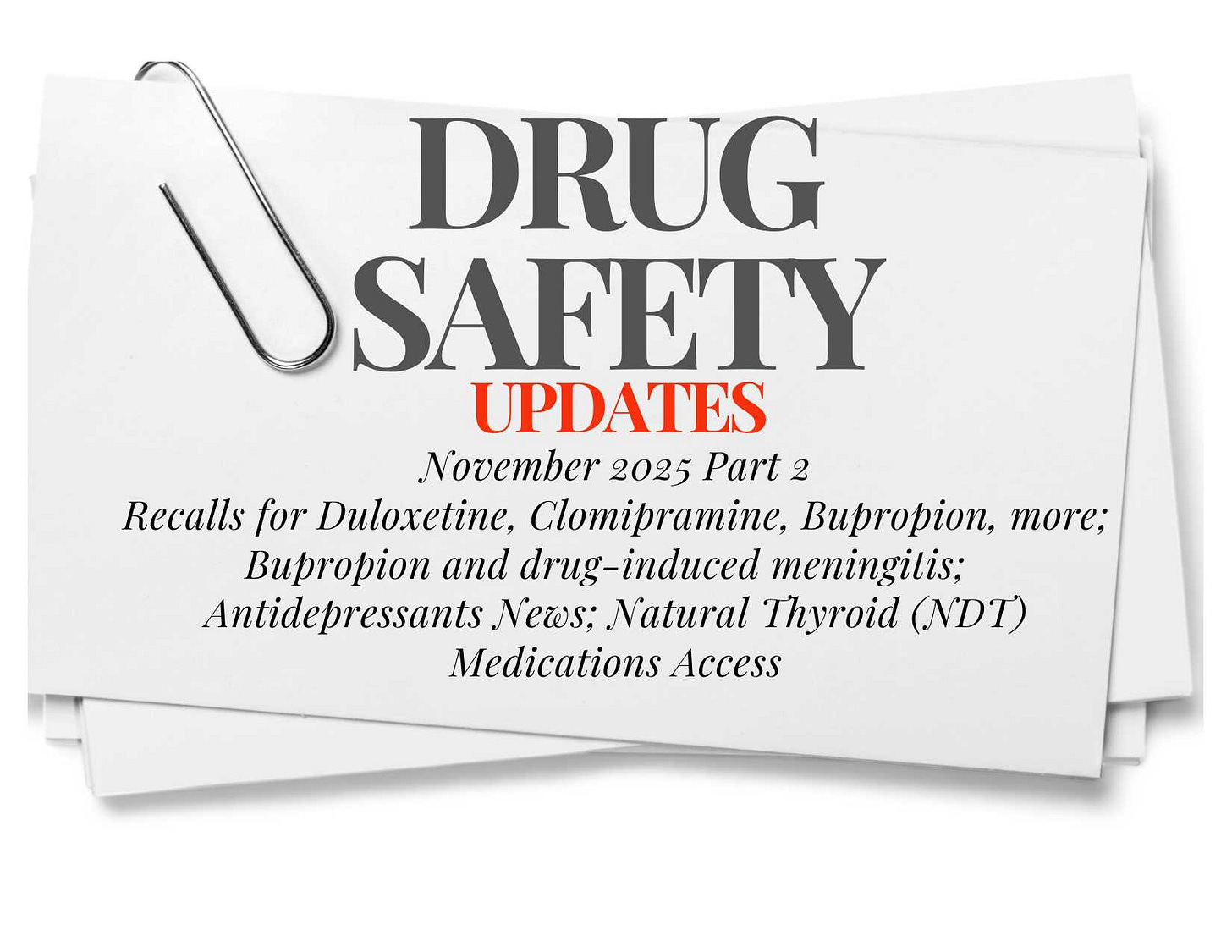November Drug Safety Part 2: Huge Duloxetine and Zyban generic recall; Bupropion-containing meds; Caplyta for major depression; TMS device approved; Hypothyroid treatments
This week, only by coincidence, many of the drugs with an FDA recall or safety update are antidepressant treatments. One of them (Caplyta) is an antipsychotic that recently received expanded approval to treat major depression.
Huge Duloxetine Recall by Breckenridge
A huge recall is underway for a Cymbalta generic: Breckenridge’s Duloxetine Delayed-Release Capsules, 60 mg strength. More than 170,000 bottles are being recalled due to nitrosamine impurities (a potential cancer risk) above FDA limits. Cymbalta is an antidepressant and anxiety treatment.
FDA Recall Announcement
Clomipramine Hydrochloride by Northstar
Three different strengths (25mg, 50mg, and 75mg) of Clomipramine Hydrochloride capsules, generic for Anafril, are under recall by Northstar because of nitrosamine impurities (a potential cancer risk) above FDA limits. These pills were manufactured by: Zydus Lifesciences Ltd. Quantity is not provided, but check the announcement for lot numbers. Anafril is classified as a “tricyclic” antidepressant, approved in 1989, but is most often used to treat OCD (obsessive compulsive disorder).
FDA Recall Announcement
Bupropion Recall by Graviti Pharmaceutical
Graviti Pharmaceutical’s Bupropion Hydrochloride Extended-Release Tablets XL (Zyban generic) are under recall for quality control failures. The recall affects 46,512 bottles of 300 mg strength (30-count), distributed and packaged by Rising Pharma. The label features the “Rising Pharma” logo. Zyban (now only available as generic) is a treatment for patients who are trying to quit smoking.
FDA Recall Announcement
Additional Recalls
Check out these additional recall summaries posted at our website: Parkinsons: Carbidopa/Levodopa/Entacapone (by Rising Pharma); Schizophrenia/bipolar: Chlorpromzine (by Major Pharmaceuticals); Cholesterol lowering: Niacin extended release (46,848 bottles by Lanett) and pain reliever Tylenol (500 mg caplets by Kenvue Brands).
Bupropion-Containing Drugs: Risk of Drug-Induced Meningitis
Bupropion-containing drugs have new warnings about the risk of a condition called “aseptic meningitis”, or drug-induced meningitis. Meningitis is an infection of the membranes covering the brain and spinal cord, and is usually caused by a virus or bacteria. Aseptic meningitis is not caused by bacteria but could be caused by a drug or virus. Symptoms may include headache, stiff neck, or sensitivity to light.
Read about the different kinds of meningitis at Cleveland Clinic: Meningitis: Causes, Symptoms, Treatment
These bupropion-containing drugs contain the new warnings:
Aplenzin (bupropion hydrobromide) extended release tablets
In addition to the new warning about aseptic meningitis, Aplenzin’s drug label has a new warning about a severe skin hypersensitivity reaction called eosinophilia and systemic symptoms (DRESS). Aplenzin is approved to treat major depression as well as seasonal affective disorder (SAD).
Aplenzin Safety Label Change
Auvelity (dextromethorphan hydrobromide and bupropion hydrochloride) extended release tablets
Approved in 2022, Auvelity treats major depression in adults. The revised label includes the new warning about aseptic meningitis.
Auvelity Safety Label Change
Contrave (naltrexone and bupropion)
Label was updated with the warning about aseptic meningitis along with the risk of severe skin reaction called Acute generalized exanthematous pustulosis (AGEP). Contrave is approved as a weight loss treatment in adults with at least one weight-related comorbid condition, such as hypertension or high cholesterol. It is a combination of bupropion hydrochloride (used in antidepressants) and naltrexone hydrochloride (most often used as an alcohol or opioid addiction treatment). Contrave was approved in 2014.
Contrave Safety Label Change
Additional Bupropion-Containing Medications with Updates
All of the following medications are antidepressant treatments:
Forfivo XL Safety Label Update
WELLBUTRIN Safety Label Update,
WELLBUTRIN SR Safety Label Update
WELLBUTRIN XL Safety Label Update
Depression Treatments Approvals
TMS Device by Brainsway
Brainsway received approval for its Transcranial Magnetic Stimulation (TMS) device to treat major depressive disorder (MDD) in adolescents age 15 – 21.
Psychiatric Times: “FDA Clears Deep Transcranial Magnetic Stimulation for Adolescents With MDD”
Psychology Today explains why TMS treatments have been slow to catch on - and why the public has instead been captivated by psychedelic treatments like ketamine: “There is a natural tendency to compare TMS with electroconvulsive therapy (ECT), which may be a deterrent. ECT, unlike TMS, is not targeted, using direct electrical current to “reset” the brain by inducing a generalized seizure. ECT is highly effective, the gold standard around 80% and well-tolerated, but requires sedation, anesthesia, and recovery.”
Psychology Today: Could Acclerated TMS for Depression Become Standard? Emerging treatment protocols offer guidance to safely expand TMS use.
Caplyta (lumateperone ) Capsules: Newly Approved for Major Depressive Disorder
J&J’s Caplyta recently received expanded FDA approval as a treatment for major depression in adults, to be used along with an antidepressant. Adults who don’t respond to an antidepressant alone may be prescribed this antipsychotic as an adjunctive treatment.
Caplyta Drug Label Safety Update
Patient Opinions about Caplyta on Ask a Patient
In this newsletter, an expanded FDA approval or revised drug safety information is described and includes a link to the associated drug label change. Today, we’re taking a closer look at a drug label change to show how risk information might be edited or removed in a revision, sometimes without an explanation as to why the changes are being made. In the case of Caplyta, it is notable that the Tardive Dyskinesia Warning Section was significantly reduced. If you’d like to learn more, check out:
Special Feature: Caplyta (lumateperone ) Capsules: How a New Approval Can Change a Drug Label in Unexpected Ways
(The article will be posted by November 17.)
Recommended Podcast: “Why is the FDA Planning to Ban Natural Desiccated Thyroid?”
After a recent FDA announcement, many patients are concerned they will lose access to NDTs, or natural desiccated thyroid, a type of medication used for hypothyroidism. The FDA says that concentrations of active ingredient in the natural products are not consistent and the source materials (dried or “natural desiccated” thyroid gland, usually from a pig) may have impurities. Examples of these products include Armour Thyroid, NP Thyroid, Nature Thyroid, and more. Recently, the FDA alerted makers of these products that patients will need to transition to FDA-approved synthetic versions (such as levothyroxine) by August 2026. However, more than 1.5 million patients rely on the natural treatments (which have been used for more than 100 years) because they don’t respond to the synthetic treatment..
Terry and Joe Graedon of the People’s Pharmacy interviewed endocrinologist Antonio Bianco and author and patient advocate Mary Shoman, who explain why some people don’t respond to the synthetic treatments. They also speculate on chances that the meds will gain swift approval without resulting in price hikes.
Check out patient opinions about Armour Thyroid at Ask a Patient
Link to Podcast (from November 15) at People’s Pharmacy or on Apple Podcast


